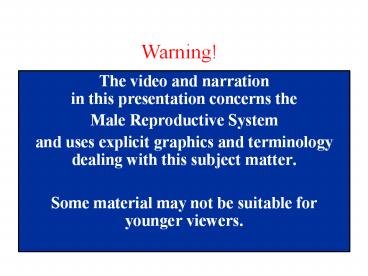The video and narration in this presentation concerns the PowerPoint PPT Presentation
1 / 24
Title: The video and narration in this presentation concerns the
1
Warning!
- The video and narration in this presentation
concerns the - Male Reproductive System
- and uses explicit graphics and terminology
dealing with this subject matter. - Some material may not be suitable for younger
viewers.
2
Mariebs Human Anatomy and Physiology Ninth
Edition Marieb w Hoehn
- Chapter 27
- Male Reproductive System
- Lecture 18
- Part 2 Accessory Organs, Sex Hormones
3
Male Internal Accessory Organs
Figure from Holes Human AP, 12th edition, 2010
4
Epididymis
Figures from Martini, Anatomy Physiology,
Prentice Hall, 2001
Takes about 2 weeks for sperm to travel through
the epididymis
- Maintains fluid produced in the seminiferous
tubules- Recycles damaged sperm and cellular
debris- Store and protects sperm, and aids in
their maturation
5
Ductus (Vas) Deferens
- muscular tube about 45 cm long transports sperm
( can store sperm for several months) - extends from epididymis to ejaculatory duct
Figure from Martini, Anatomy Physiology,
Prentice Hall, 2001
6
Seminal Vesicles
- attached to ductus deferens near base of bladder
- secretes alkaline fluid (60 of the volume of
semen) - secretes fructose, prostaglandins, and
proseminogelin - begins capacitation of sperm
- contents empty into ejaculatory duct
Figure from Martini, Anatomy Physiology,
Prentice Hall, 2001
7
Prostate Gland
- surrounds beginning of urethra
- ducts of gland open into urethra
- secretes a thin, milky, slightly acidic fluid
(20-30 of semen volume) - secretion enhances fluid mobility
- contains seminalplasmin
- secretes Prostate-specific Antigen (PSA)
- composed of tubular glands in connective tissue
- also contains smooth muscle
Figure from Martini, Anatomy Physiology,
Prentice Hall, 2001
8
Bulbourethral (Cowpers) Gland
- inferior to the prostate gland
- secretes thick, alkaline mucus - helps lubricate
the tip of the penis (glans) and neutralize any
urinary acids in urethra - fluid released in response to sexual stimulation
Figure from Martini, Anatomy Physiology,
Prentice Hall, 2001
9
Semen
- sperm cells
- secretions of seminal vesicles, prostate gland,
and bulbourethral glands (seminal fluid) - slightly alkaline (offsets acidity of ?
reproductive tract) - prostaglandins (stimulates contraction in ?
reproductive tract) - nutrients
- enzymes (protease, seminalplasmin, fibrinolysin)
- 20-100 million sperm cells per milliliter
- usually about 2-5 ml of fluid per ejaculate
10
Male External Reproductive Organs
Figure from Martini, Anatomy Physiology,
Prentice Hall, 2001
11
Scrotum
Figure from Martini, Anatomy Physiology,
Prentice Hall, 2001
- pouch of skin and subcutaneous tissue
- dartos muscle smooth muscle in dermis
contracts to cause wrinkling of the scrotum
(traps heat) - medial septum divides scrotum into two chambers
- each chamber lined with a serous membrane
- each chamber houses a testis and epididymis
Cremaster muscle can retract testes
12
Penis
Connection of penis to body wall (root)
13
Penis
Figure from Holes Human AP, 12th edition, 2010
14
Penis
Figure from Holes Human AP, 12th edition, 2010
Preputial glands in the prepuce (foreskin)
produce a waxy material called smegma. This can
be a source of bacterial growth if hygiene is
poor. Circumcision is the surgical removal of the
prepuce.
15
Erection, Orgasm, and Ejaculation
- Erection
- parasympathetic nerve impulses
- blood accumulates in erectile tissues
- Orgasm
- culmination of sexual stimulation
- accompanied by emission and ejaculation
- Emission and Ejaculation
- emission is the movement of semen into urethra
- ejaculation is the movement of semen out of the
urethra - largely dependent on sympathetic nerve impulses
16
Mechanism of Penile Erection
Bulbospongiosus m. Ischiocavernosus m.
17
Mechanism of Emission and Ejaculation
Figure from Holes Human AP, 12th edition, 2010
18
Hormonal Control of Male Reproductive Functions
Figure from Holes Human AP, 12th edition, 2010
- hypothalamus controls maturation of sperm cells
and development of male secondary sex
characteristics - negative feedback controls concentration of
testosterone
19
Actions of Testosterone
- increased growth of body hair
- sometimes decreased growth of scalp hair
- enlargement of larynx and thickening of vocal
cords - thickening of skin
- increased muscular growth
- thickening and strengthening of the bones
Know these actions
20
Review
- Male Accessory Organs
- Epididymis
- Maintains fluid produced in the seminiferous
tubules - Recycles damaged sperm and cellular debris
- Store and protects sperm, and aids in their
maturation - Vas (ductus) deferens muscular tube for sperm
transport and storage - Seminal vesicle
- Alkaline fluid with fructose, prostaglandin, and
fibrinogen - About 60 of semen volume in ejaculate
21
Review
- Male Accessory Organs (contd)
- Prostate gland
- Thin, milky fluid
- 20-30 of semen volume in ejaculate
- Seminalplasmin
- Bulbourethral glands
- Cowpers glands
- Thick, mucus-like substance
- Lubricates glans of penis
- Neutralizes acids in urethra
22
Review
- Semen
- Sperm seminal fluid
- 20-100 million sperm per ml in ejaculate (2-5 ml)
- Contains enzymes
- External Reproductive Organs
- Scrotum
- Contains and separates testes
- Cremaster and dartos muscles regulate temperature
of testes - Penis
- Root, body (shaft), and glans prepuce (foreskin)
- Erectile tissues (c. cavernosum, c. spongiosum)
- Urethra (common pathway for urine and sperm)
- Prepuce
23
Review
- Erection, orgasm, emission, and ejaculation
- Erection
- Filling of erectile tissues with blood venous
drainage is blocked - Controlled by parasympathetic NS (nitric oxide)
- Orgasm - highly pleasurable culmination of the
sexual experience, accompanied by emission and
ejaculation - Emission - movement of semen into urethra
- Ejaculation - movement of semen out of urethra
- Orgasm, emission, and ejaculation are controlled
by the sympathetic NS
24
Review
- Hormonal control of male reproductive system
- FSH
- Meiosis in primary spermatocytes
- Secretion of inhibin by sustentacular cells
- LH (ICSH)
- Secretion of androgens (testosterone) by
interstitial cells - Levels of FSH and LH inhibit release of GnRH and
FSH/LH - Effects of androgens

